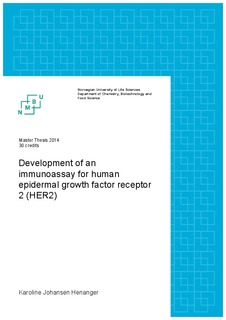Development of an immunoassay for human epidermal growth factor receptor 2 (HER2)
Master thesis
Permanent lenke
http://hdl.handle.net/11250/216643Utgivelsesdato
2014-08-04Metadata
Vis full innførselSamlinger
- Master's theses (KBM) [890]
Sammendrag
Breast cancer is one of the most common types of cancer affecting women, and approximately 15-30 % of breast cancer patients have a particularly aggressive type called HER2 positive breast cancer. These patients have tumors that overexpress human epidermal growth factor receptor 2 (HER2). HER2 is a glycoprotein found on the cell surface, and the extracellular domain (ECD) of this protein can be proteolytically cleaved and released into the blood circulation where it could be useful as a tumor marker to monitor the treatment response in HER2 positive patients. However, there are few assays available for HER2. The aim of this master thesis was therefore to develop a robust and sensitive immunoassay specific for HER2 ECD.
Six monoclonal antibodies (M75, M77, M79, M83, M84 and M89) that recognise both recombinant and native HER2 were utilized to develop an immunometric assay for serum HER2. The antibodies were characterized, and antibody pair combinations were evaluated in a two-site assay to find the antibody combination with the highest sensitivity towards native HER2. Biotin labelled M89 and europium labelled M83 was the best combination, and this assay was further optimized and automated using an AutoDELFIA instrument. The final assay was used to test 15 HER2 positive patient samples and the results were compared with patient results obtained in the commercial Siemens ADVIA Centaur Serum HER-2/neu immunoassay. The sample results from the new HER2 assay were generally lower than the sample results from the Siemens assay, but there was a good linear correlation between the assays. Thus, a robust assay with high sensitivity towards HER2 ECD was developed.
